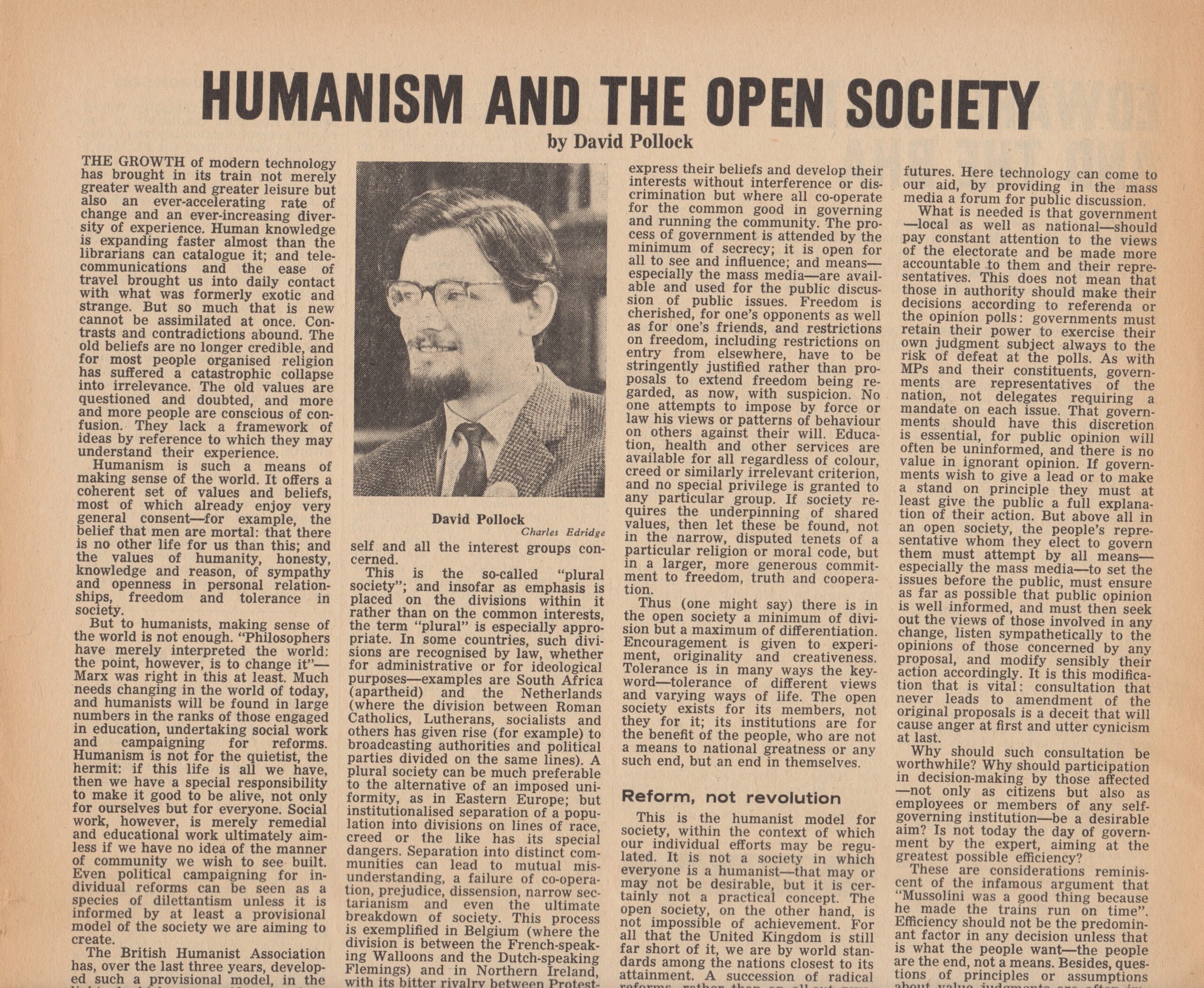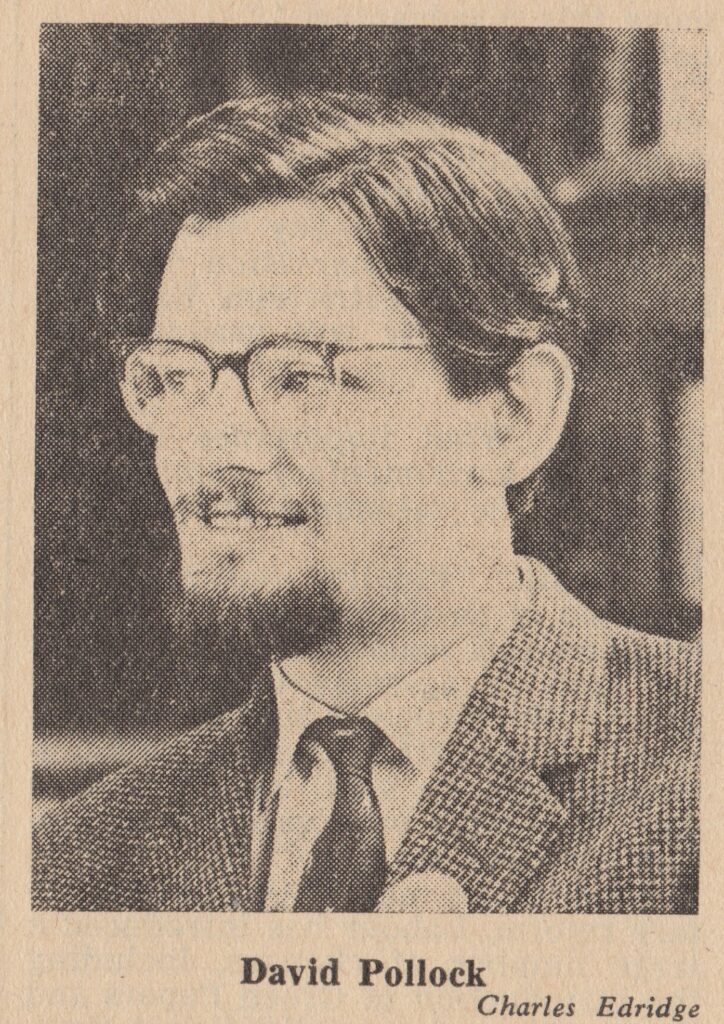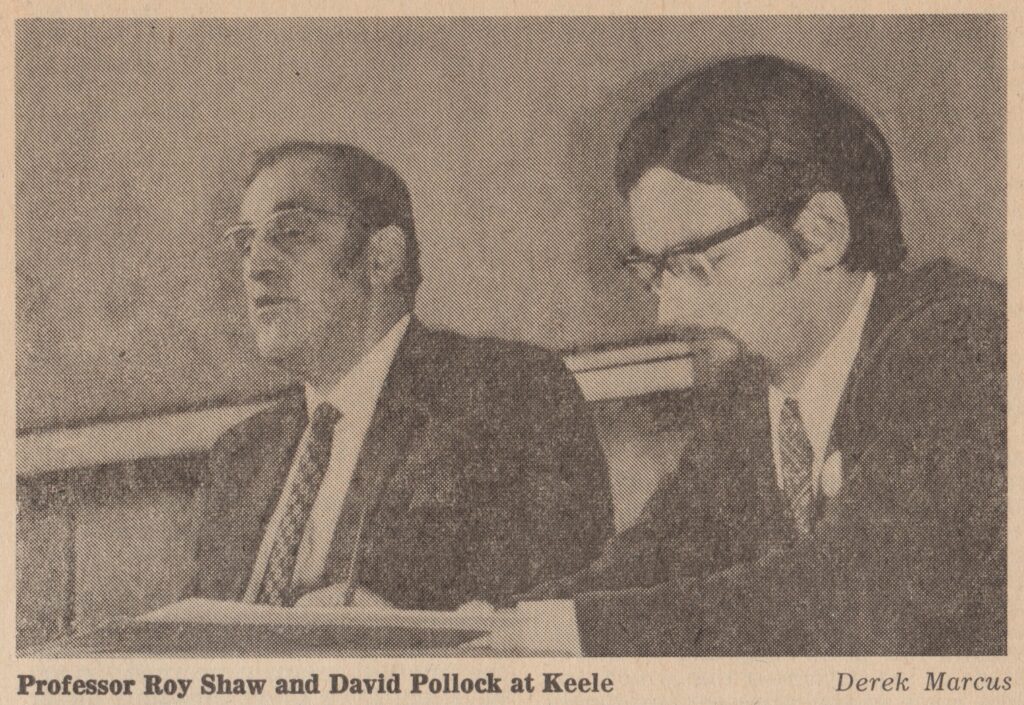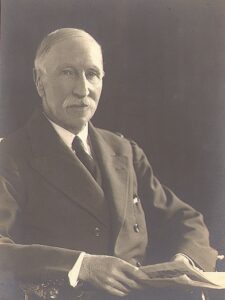

Much needs changing in the world of today, and humanists will be found in large numbers in the ranks of those engaged in education, undertaking social work and campaigning for reforms. Humanism is not for the quietist, the hermit: if this life is all we have, then we have a special responsibility to make it good to be alive, not only for ourselves but for everyone.
David Pollock, ‘Humanism and the Open Society’
In December 1969, the British Humanist Association (now Humanists UK) organised a two day conference, exploring practical ways of bringing about an ‘open society’. In 1970, across two issues of the BHA’s journal Humanist News, David Pollock (who became Chairman of the BHA that year), elaborated on the ideas and ideals of the open society, and considered the specific role of humanists in helping to achieve it. Writing in 2021, Pollock noted that although ‘much of the optimism exhibited in the article now seems naïve… the idea of the open society and what could be achieved within its framework shows the idealism of the time’.

Humanism and the Open Society: Part 1
August/September 1970, Humanist News
By David Pollock
The growth of modern technology has brought in its train not merely greater wealth and greater leisure but also an ever-accelerating rate of change and an ever-increasing diversity of experience. Human knowledge is expanding faster almost than the librarians can catalogue it; and telecommunications and the ease of travel brought us into daily contact with what was formerly exotic and strange. But so much that is new cannot be assimilated at once. Contrasts and contradictions abound. The old beliefs are no longer credible, and for most people organised religion has suffered a catastrophic collapse into irrelevance. The old values are questioned and doubted, and more and more people are conscious of confusion. They lack a framework of ideas by reference to which they may understand their experience.

Humanism is such a means of making sense of the world. It offers a coherent set of values and beliefs, most of which already enjoy very general consent – for example, the belief that men are mortal; that there is no other life for us than this; and the values of humanity, honesty, knowledge and reason, of sympathy and openness in personal relationships, freedom and tolerance in society.
But to humanists, making sense of the world is not enough. “Philosophers have merely interpreted the world: the point, however, is to change it” – Marx was right in this at least. Much needs changing in the world of today, and humanists will be found in large numbers in the ranks of those engaged in education, undertaking social work and campaigning for reforms. Humanism is not for the quietist, the hermit: if this life is all we have, then we have a special responsibility to make it good to be alive, not only for ourselves but for everyone. Social work, however, is merely remedial and educational work ultimately aimless if we have no idea of the manner of community we wish to see built. Even political campaigning for individual reforms can be seen as a species of dilettantism unless it is informed by at least a provisional model of the society we are aiming to create.
The British Humanist Association has, over the last three years, developed such a provisional model, in the light of which our specific campaigns and our social action can be seen in perspective. This note examines the humanist attitude to society and describes our model or ideal – the Open Society.
The plurality of society
The social structure has always been complex. It has never been simply a matter of upper, middle and lower class, or of capitalists and workers; there has never been a standard “received” morality which no one has seriously questioned; nor ever a time when everyone without exception followed a single religious faith. But it is undeniable that in the last several decades society has become spectacularly more diverse. It is not only that by immigration society has become multi-racial and multi-credal. The advance of knowledge and the spread of education have engendered in everyone a more critical attitude toward the old moral and political certainties, and the growth of leisure time has led to a vast diversification of interests. There is wide and deep disagreement about politics, about social priorities, about moral judgements; and the “scatter” of views and of interests is broader than ever before. His every attitude, his every activity, today places man in a new category or group within society – actually or potentially organised in its own interests: trade unions, clubs, political parties, campaigns, charitable movements and so on. Government at all levels has to take constant account of the countless different pressures brought upon it by such organisations – indeed, in a “political”1 or democratic state, the process of government largely consists in making decisions which may be seen as a series of careful compromises between the government itself and all the interest groups concerned.
This is the so-called “plural society”; and insofar as emphasis is placed on the divisions within it rather than on common interests, the term “plural” is especially appropriate. In some countries, such divisions are recognised by law, whether for administrative or for ideological purposes – examples are South Africa (apartheid) and the Netherlands (where the division between Roman Catholics, Lutherans, socialists and others has given rise (for example) to broadcasting authorities and political parties divided on the same lines). A plural society can be much preferable to the alternative of an imposed uniformity, as in Eastern Europe; but institutionalised separation of a population into divisions on lines of race, creed or the like has its special dangers. Separation into distinct communities can lead to mutual misunderstanding, a failure of co-operation, prejudice, dissension, narrow sectarianism and even the ultimate breakdown of society. This process is exemplified in Belgium (where the division is between the French-speaking Walloons and the Dutch-speaking Flemings) and in Northern Ireland, with its bitter rivalry between Protestant and Roman Catholic. The recent riots in both countries point to the moral that, while “divide and rule” may be a good maxim for an autocrat, it is a dangerous one for a democrat.
Even when such dire results are not forthcoming, the tying of labels to people tends in the hands of officialdom to result in restricting their freedom. In Britain today not everyone is equal before the law, and the administrative machinery lends official support to irrelevant discrimination. Women will for some years still generally be paid less than men for the same work, and special laws regulate what hours they may work and in what jobs. Those who lead an itinerant life, and anyone without a fixed address, find they are rarely able to obtain the social benefits to which they are entitled. Virtually every official function – from Parliament to the prisons – is blessed with an Anglican chaplain, and just as the Church of England occupies a highly privileged place in society, so the Christian religion does throughout the educational system, where the survival of sectarian schools, attended by one in four children, is especially objectionable.
The Open Society
The Open Society is correctly contrasted with the closed society, the abode (as Popper2 says) of totalitarianism and taboo, while plurality is properly the opposite of uniformity. However, in the context of the United Kingdom, it is useful to consider the open society, which is a special form of plural society, in which division (it often seems) is made a virtue.
The open society is one where people with different views, backgrounds and interests are free to express their beliefs and develop their interests without interference or discrimination, but where all co-operate for the common good in governing and running the community.
In an open society, there is the same plurality of views, the same clash of interests, but there is emphasis also on the values and interests held in common. The open society is one where people with different views, backgrounds and interests are free to express their beliefs and develop their interests without interference or discrimination, but where all co-operate for the common good in governing and running the community. The process of government is attended by the minimum of secrecy; it is open for all to see and influence; and means – especially the mass media – are available and used for the public discussion of public issues. Freedom is cherished, for one’s opponents as well as for one’s friends, and restrictions on freedom, including restrictions on entry from elsewhere, have to be stringently justified rather than proposals to extend freedom being regarded, as now, with suspicion. No one attempts to impose by force or law his views or patterns of behaviour on others against their will. Education, health and other services are available for all regardless of colour, creed or similarly irrelevant criterion, and no special privilege is granted to any particular group. If society requires the underpinning of shared values, then let these be found, not in the narrow, disputed tenets of a particular religion or moral code, but in a larger, more generous commitment to freedom, truth and cooperation.
Thus (one might say) there is in an open society a minimum of division but a maximum of differentiation. Encouragement is given to experiment, originality and creativeness. Tolerance is in many ways the keyword – tolerance of different views and varying ways of life. The open society exists for its members, not they for it; its institutions are for the benefit of the people, who are not a means to national greatness or any such end, but an end in themselves.
Reform, not revolution
This is the humanist model for society, within the context of which our individual efforts may be regulated. It is not a society in which everyone is a humanist – that may or may not be desirable, but it is certainly not a practical concept. The open society, on the other hand, is not impossible of achievement. For all that the United Kingdom is still far short of it, we are by world standards among the nations closest to its attainment. A succession of radical reforms, rather than an all-out revolution, is required to carry us the rest of the way, albeit reforms so expansive as to amount in some eyes to a peaceful revolution.3 Humanists, setting no store by sectarianism, hope to be joined as protagonists for the open society by other groups in society, who will cooperate in advocating and working towards the goal.
This will only be possible by (broadly speaking) political means – by campaigning for individual reforms by all the traditional methods available to pressure groups in this country. There is no magic solution, no short cut, to the open society; its achievement cannot rely on methods alien to the open society itself. For the methods by which the open society works are an essential part of its character, a refinement of democracy to take account of the inevitable transfer of power during the present century from Parliament to the Cabinet and the Prime Minister and the growth of bureaucracy on the heels of technology. In a society without technology, all the decisions are within the grasp of the ordinary, educated man; the paradigm description of the open society remains in many ways that of Pericles in the Funeral Oration;4 but in the complex world of technology the theory has to be developed and amended.
We cannot all gather to debate in the market place, but we could have more say than at present in the decisions that shape our futures.
There is considerable cynicism at present about the role of democracy. To some it seems to consist in no more than the quinquennial election of a government. The words of Shaw, “Democracy substitutes election by the incompetent many for appointment of the corrupt few”, would be widely echoed. It is in fact the machinery of political debate and government that above all needs to be altered if we are to create an open society. We cannot all gather to debate in the market place, but we could have more say than at present in the decisions that shape our futures. Here technology can come to our aid, by providing in the mass media a forum for public discussion.
What is needed is that government – local as well as national – should pay constant attention to the views of the electorate and be made more accountable to them and their representatives. This does not mean that those in authority should make their decisions according to referenda or the opinion polls: governments must retain their power to exercise their own judgement subject always to the risk of defeat at the polls. As with MPs and their constituents, governments are representatives of the nation, not delegates requiring a mandate on each issue. That governments should have this discretion is essential, for public opinion will often be uninformed, and there is no value in ignorant opinion. If governments wish to give a lead or to make a stand on principle they must at least give the public a full explanation of their action. But above all in an open society, the people’s representative whom they elect to govern them must attempt by all means – especially the mass media – to set the issues before the public, must ensure as far as possible that public opinion is well informed, and must then seek out the views of those involved in any change, listen sympathetically to the opinions of those concerned by any proposal, and modify sensibly their action accordingly. It is this modification that is vital: consultation that never leads to amendment of the original proposals is a deceit that will cause anger at first and utter cynicism at last.
Why should such a consultation be worthwhile? Why should participation in decision-making by those affected – not only as citizens but as employees or members of any self-governing institution – be a desirable aim? Is not today the day of government by the expert, aiming at the greatest possible efficiency?
These are considerations reminiscent of the infamous argument that “Mussolini was a good thing because he made the trains run on time”. Efficiency should not be the predominant factor in any decision unless that is what the people want – the people are the end, not a means. Besides, questions of principles or assumptions about value judgements are often implicit in what are presented as matters of technical expertise – for example, the location of a new airport. The “experts”, moreover, do not have a monopoly on efficiency. They, after all, do not have to live with the results of their proposals; and it is likely that those involved in any change – the workers in a factory, the residents in a traffic scheme – will have relevant experience and ideas to contribute, which can lead to a better solution than that devised by any third party working alone, however expert.
Further, participation in a meaningful debate, involvement in the decision-making process, leads naturally to a psychological commitment to the decision finally taken, even if it differs by far from one’s original views. One man may be led to a change of mind and a full acceptance of the decision; another may regard it merely as the best compromise available, but in the event both will be predisposed to make the system work since they have helped create it. There will be a greater willingness to change patterns of work, to cooperate in new rules. The popular business philosophy of management by objectives is built on the same elementary psychological insight, as is also the practice of detailed consultation with employees found in many nationalised industries.
Inviting people to participate in making decisions that will affect their futures amounts to treating them as adults rather than as children, as persons rather than as objects or units to be manipulated. It is likely to lead in the long run to a better quality of life for all concerned. And the only alternative is to expect everyone to obey authoritarian orders and fall in with the neat systems of the bureaucrats and technocrats.

Humanism and the Open Society: Part 2
October 1970, Humanist News
By David Pollock
If the case for participation can be cogently argued in theory, there are nevertheless immense difficulties in putting it into practice. Even given the goodwill of all concerned, we still lack much of the practical expertise and psychological insight necessary to assure success in the simplest experiment. Often goodwill itself is lacking when participation is seen as a threat to established power or privilege. Moreover, those who advocate caution in the face of demands for radical reform are not always or solely motivated by conservatism: ill-prepared schemes risk both immediate disruption and long-term discouragement of change. This is not an argument for apathy but for intensified and intelligent initiatives wherever they are possible coupled with careful study of such experiments so that the lessons learned may be applied elsewhere.
It was in the universities and colleges that participation first became a key demand, especially in those of de Gaulle’s France in May 1968. The centralisation of the French educational system served to magnify and aggravate the frustration felt in many countries by students whose contemporaries were often earning their own living and already raising families at being treated like children and subjected to petty, paternalistic discipline. The explosion that resulted came near to ending the Fifth Republic and had echoes all round the world. In this country in October the same year a joint statement by the National Union of Students and the Committee of Vice-Chancellors indicated their broad agreement on the scope of student involvement desirable in the running of university life. They distinguished between matters – such as welfare and student discipline – where student participation in decision-making was appropriate and matters where consultation was desirable but the ultimate decisions should be reserved to “the statutorily responsible body” – for example, curricula and courses. They said that students should have no part in decisions on appointments, admissions and related matters but should be consulted on “the general principles in such decisions”.

Much quiet progress has been made in implementing the provisions of this statement, though not without local disagreements and calls for more radical reform, and student participation in university government was endorsed last year by a report of the House of Commons Select Committee on Education.
Many schools already have school councils of one form or another, and some are organised as full democratic communities, the pupils having real responsibility for decisions about school rules, voluntary activities and even curricula.
Meanwhile, demands were being voiced for similar participation in the school community, one of the last strongholds of authoritarianism in the country. Following in the footsteps of the French Comités d’Action Lycéens, the Schools Action Union issued a manifesto which called not only for the abolition of the prefect system, of restrictive, irrelevant school rules and of examinations in their present form but also for the control of schools by elected “school councils” consisting of pupils and staff. As the current Secretary of the SAU says, “Democracy can’t just be a subject in the classroom: it has to be a part of school life as well”. Many schools already have school councils of one form or another, and some are organised as full democratic communities, the pupils having real responsibility for decisions about school rules, voluntary activities and even curricula. In many schools, too, there are social service projects that involve pupils in the local community.
Participating at Work
The experience of such responsibility is itself profoundly educative – a vital part of the moral education advocated by Humanists. No one can act responsibly without being given responsibility. In particular, in this and other aspects of its daily life the school must prepare young people for the demands of adult life in a democratic community. The practice of democracy requires knowledge of how the system works, perception and judgement in reaching an opinion and skills of argument and compromise in advocating it. Yet too often we give young people no training or preparation for the exercise of these rights and obligations, expecting them to be obedient children at one moment and responsible citizens the next. Participation in running the school community can provide an experience of the greatest value in an environment where learning from mistakes can be afforded.
Participation can start even earlier, in the family, with joint decisions about important matters – moving house, where to go for the summer holidays. But it is futile to have participation and consultation for young people, to treat them as adults, if when they are in fact adults, at work or as citizens, they are treated as children.
So, enlightened management, rejecting finally the paternalism of the Port Sunlight past, must in future devise means for employees to be fully consulted about and take part in the management of the enterprises to which they contribute their working lives. This can in fact be seen as one aspect of a major effort to humanise the routine of office and factory, which, as well as being entirely desirable in itself, will be essential from the companies’ point of view if they wish to retain the services of their employees. For example, in Holland scarcity of labour and the cost of training new workers have led Philips, the giant electrical and pharmaceutical firm, to experiment extensively and successfully with “work structuring” – fitting work to the motivations and capacities of the people available rather than them to it. This has involved the abolition of production line methods in favour of work in small groups, often without close supervision.
Workers’ participation is a virtual synonym of industrial democracy, itself the subject of an important lecture recently by Professor Kenneth F. Walker of the International Institute for Labour Studies. His theme is that industrial democracy is not any one thing: it is a label that can be attached to a number of different developments, of which he distinguishes four. These are (1) democratisation of ownership; (2) democratisation of government; (3) democratisation of the terms of employment; and (4) democratisation of management.
The first two come closest to popular notions of industrial democracy, but practical experience of them does not indicate that they affect significantly the everyday lives of their workers. For example, in the John Lewis partnership and the Scott Bader Commonwealth (the latter a resin and plastics firm with a turnover approaching £5m), which are both owned by their “employees”, the prevailing ethos is one of enlightened paternalism rather than workers’ control. Likewise, Professor Walker quotes experience in Germany, Israel and Holland to show that the appointment of worker-directors to company boards, besides raising far-reaching questions as to the function and responsibility of boards of directors, “does not necessarily democratise management at lower levels in the enterprise”. (The British Steel Corporation has worker-directors on its individual company boards, but since these boards are only advisory the experiment is unlikely to have far-reaching effects.)
Role of the Unions
The third form of industrial democracy treated by Professor Walker – democratisation of the terms of employment – amounts in fact to the increasingly frequent intervention in questions of management by trade unions in the course of collective bargaining. This is the most common and effective way today whereby workers can exercise any control over the conditions under which they work, although the extent to which it is democratic depends on the extent to which the workers democratically determine their union’s policy. As Vic Feather, General Secretary of the TUC, wrote in his foreword to Professor Walker’s lecture: “As long as trade unions can strengthen their organisation and their competence, remaining, of course, representative of workpeople and accountable to them, any and every development in trade union function will represent a measure of progress in industrial democracy.” Clive Jenkins, joint general secretary of ASTMS, the militant “white collar” union, spoke at BHA’s seminar on the Open Society in December 1969 of the union being a “shadow government” in every factory and said (optimistically, perhaps) that the unions could become “the most dynamic factor in the reform of British industry”. He referred to the difficulties created by the continuing coalescence of companies into monstrous international conglomerate businesses and to the need for fuller information about company finances and plans. This is a point that has been recognised by the major political parties, however, who are agreed in principle that the law should compel disclosure of much information now kept secret. Elsewhere, Clive Jenkins has been quoted as saying of this extension of collective bargaining: “We were too frail in the past but we’re stronger now and this must come”.
Management
Lastly comes the democratisation of management. Whereas the other forms of industrial democracy either did not touch the employee’s immediate concerns or did not allow him direct participation, democracy of management does both, for it is the sharing by managers of their decision-making power with those who on each occasion are directly affected. This may be done either informally by a “change of style” on the part of supervisors and managers or formally through works councils or similar bodies or by making managers accountable to employees for their decisions. Professor Walker concludes that neither is sufficient without the other. American companies lead in this field: IBM and Mars are examples. Another, Texas Instruments, has a subsidiary company in England which, apart from its wholly egalitarian social conditions (canteens, car parks etc.), has “elaborate programmes to make sure their staff can express their feelings about work. Departments have twice-weekly work group sessions in which work is discussed and an ‘improvement survey’ is conducted regularly to find out where people are dissatisfied. Staff are also constantly taught what happens to the work they are doing, what contribution it is making. Tied up with this is a degree of freedom with information, including financial, about how and what the company is doing”. The National Coal Board has taken steps in the same direction, holding “face team conferences” of all the men working on a single coal face – up to a hundred – at which they discuss working methods and plans for their face. The conferences are held during working hours and last a full day. The NCB Board Member for industrial relations, Cliff Shephard, has said: “We must do what we can to ensure that time at work is not simply a means of paying for leisure but is also, in itself, satisfying and creative”. What is more, he says, “it pays off”.
Texas Instruments Ltd. agree that participation leads to efficiency. There are many reasons why this should be so. For example, workers will often have sensible and useful new ideas; they will accept decisions more willingly if they have taken part in making them; participation will lead to industrial peace and co-operation; it will even induce greater efficiency in managers who have to justify their decisions or proposals to the workers. That companies initiate programmes of participation partly or mainly for reasons of efficiency is, of course, no reason for suspicion: rather, it is an added bonus.
What is needed is more research and a willingness to experiment, even at some cost.
None of these ideas will, in itself, solve the basic, vexed question of industrial and economic power; but there is no point in rejecting practical partial solutions in favour of unattainable dreams. What is needed is more research and a willingness to experiment, even at some cost.
Public Life
Lastly, of course, the most obvious arena for participation is in public Iife – in government at local and at national levels. The findings of the Skeffington Committee apply not only to the physical environment (they were concerned with local planning procedures) but to our whole Iives: “People should be able to say what kind of community they want and how it should develop; and should be able to do so in a way that is positive and first-hand… This becomes all the more vital where the demands of a complex society occasion massive changes… The pace, intensity and scale of change will inevitably bring bewilderment and frustration if people affected think it is to be imposed without respect for their views. This leads all too easily to alienation between authority and people.”
Some of the specific recommendations of the Committee are of interest, too, since they also are capable of wider application. They said that local authorities should provide the public with much more information about their tentative and provisional plans, and that they should then deliberately attempt to elicit public reaction, by means of “community forums” and community development officers whose particular job this would be, so that the final policy could emerge from a dialogue between public, local council and council planning officials. Similar procedures could obviously be introduced in matters of education, health and welfare and other Iocal authority concerns. Two examples can be quoted to those who see public participation as an expensive and time-consuming luxury: one is the Stansted airport affair, where local opinion finally triumphed over the entrenched Whitehall machine. The other is a much smaller affair, but equally significant. Guy’s Hospital spent £80,000 on building a drug addiction clinic in Bermondsey. They made no attempt to explain the need to the local residents or to calm their anxieties. The residents’ fears for their children’s safety grew out of all proportion and their campaign against the clinic gained the support of their MP and other local figures. FinaIIy, they won: the clinic will not now open. It was Guy’s own fault: they should have learnt from a similar case in Lewisham a few months before. There a charitable organisation planning to open a rehabilitation hostel for ex-addicts mounted a major campaign to explain their intentions to the local authority and the local people, with the result that they won the positive support of many of the residents and of the local press.
At national level, the government already engages in wide consultation before introducing legislation. Unsurprisingly, such consultation is normally confined to the powerful interest groups immediately involved – the unions, the employers, the professions and so on. Behind closed doors a compromise is argued out, and the bargain is embodied in a Bill or (at best) a White Paper to which the government is already committed. This is presented to Parliament and the pubIic as a fait accompli, and as a rule virtually no amendment is accepted during the Bill’s passage into law, for any amendment would require the whole bargaining process to be started again. The result is that the backbench MP has as much – or as little – part in shaping the bulk of the legislation he is called to vote on as the ordinary citizen. He is equally powerless on matters of financial and foreign policy.
What is needed is that consultation should be extended to the whole community and be carried on publicly, the fullest possible information being available to everyone who wishes to take part in the debate. This wiII inevitably entail alterations in Parliamentary procedure, which should be amended to give Members of Parliament a role at an early and formative stage of legislation – a role which, unlike much of their present invaluable and undervalued work, would be squarely and healthily in the public eye.
Progress so Far
There are some hopeful signs. The Labour Government adopted the practice of issuing occasionally for public discussion so-called Green Papers, giving tentative proposals to which they did not feel committed. It is to be hoped that their successors continue both this and the previous government’s innovation of publishing their plans for public spending for five years ahead. Far too much information is kept secret that could usefully be made public; indeed, Jo Grimond has suggested that many memoranda by diplomats and civil servants should reach, if not the pubIic, then the public’s representatives in appropriate Select Committees of the House of Commons.
John Mackintosh, MP, has proposed far-reaching amendments to the legislative process, starting with the suggestion that the Green Paper should become a standard step in normal legislation, required perhaps by a House of Commons Standing Order which might name a minimum interval between its publication and the First Reading of a related BiIl. The Green Paper might well put forward alternative proposals and be designed as a brief for public discussion. Parliament should have a full debate on the subject at this stage, so that MPs would have the opportunity of helping to form or focus public opinion. (They might require to surrender the Second Reading debate on the subsequent Bill in order to make time available.) The Government would consult interested parties and should also seek out public opinion (just as local authorities are recommended to do by the Skeffington report). They would not be committed to any particular proposals and could therefore without loss of face respond to sensible new ideas and incorporate them in their BilI.
The difficulties are apparent, the disappointments are easy to foresee; but defeatism is not justified.
Other reforms of Parliamentary procedure are also desirable so as to strengthen the hand of the backbench MP as a representative of the citizen. One is the establishment for each field of government activity of a specialist Select Committee with power to investigate and criticise policies and their execution. Such committees might eventually take over from the present ad hoc “Standing Committees” the function of examining relevant Bills in detail at the Committee stage. To provide time for these extra committees, some of the ritual encounters on the floor of the House might need to be dropped: they are in any case of comparatively little value, and such a move would enhance rather than detract from the importance of the remaining business transacted by the full House. It is also to be hoped that Parliamentary proceedings will soon be televised: an edited telerecording for half an hour each day and including coverage of the committee sessions would immediately do much to restore public interest in Parliament. Consultation and participation offer no panacea. They are not an easy solution to all our problems – indeed, they are neither easy nor in themselves a solution. Rather, they are methods by which solutions may be found. If the methods are to work, the skills of argument and compromise must be cultivated (this should become an important function of the school) and ingrained habits must be broken, on the one hand of unthinkingly and unnecessarily authoritarian behaviour, on the other of the apathy and lazy cynicism of the “middle-aged dropouts”. The difficulties are apparent, the disappointments are easy to foresee; but defeatism is not justified. The demands for participation are growing, the defence of privilege becomes ever shriller, and it is democracy that is at stake – democracy and the whole quality of life in a mature community.
ln Conclusion
In conclusion, it should be noted that public debate is crippled if the several viewpoints are not represented by effectively organised groups. No government can actively consult 56 million citizens, but all governments can, if they will, consult the interest groups concerned by any question. Even those who start under the greatest handicap can in fact organise – as witness, for example, the considerable successes of the Disablement Income Group. Much of the pressure for participation and consultation has indeed come from voluntary interest groups and campaigns.
Humanists are one such interest group, engaging in public debate in order to promote humanism and what may be regarded as specifically (though rarely solely) humanist interests and proposals. But humanists are also campaigning for a change in the context and rules of public debate itself and – even more than that – for a change in the whole nature of our community and our way of thinking about it. In our advocacy of the open society and of greater participation by the public in making decisions of public moment, we hope that we shall find many allies in other groups which, though like ourselves organised primarily for other ends, nevertheless have an interest in broadening the basis of public discussion and responsibility, a concern to extend the individual’s freedom and the community’s tolerance of widely differing beliefs and ways of life – a desire (in fact) to promote a peaceful revolution.
Victory cannot be accomplished overnight; there is not one but a multitude of campaigns, bound together though they are by a unifying theme; and there are both people and institutions that will have a vested – but in the present context legitimate – interest in maintaining their own powerful and privileged positions. Against them, we can but seek to harness the groundswell of people’s dissatisfaction with the quality of life today, warning those who resist us in the words of John F. Kennedy that “those who would make peaceful revolution impossible make violent revolution inevitable”.
‘The Open Society as seen in 1970’ | Thinking about Humanism

The attempt to create communities where men and women alike share the full stature of humanity is an attempt to […]

Dr Alice Vickery was a humanist, physician, and devoted champion of women’s reproductive rights. Her tombstone inscription remembers her as […]

…for a long time, like the philosophers of old, I was trying to find indisputable foundations. How long it took […]

The international significance and reputation of Mohandas Gandhi is well-known, but his involvement with the burgeoning humanist movement during the […]